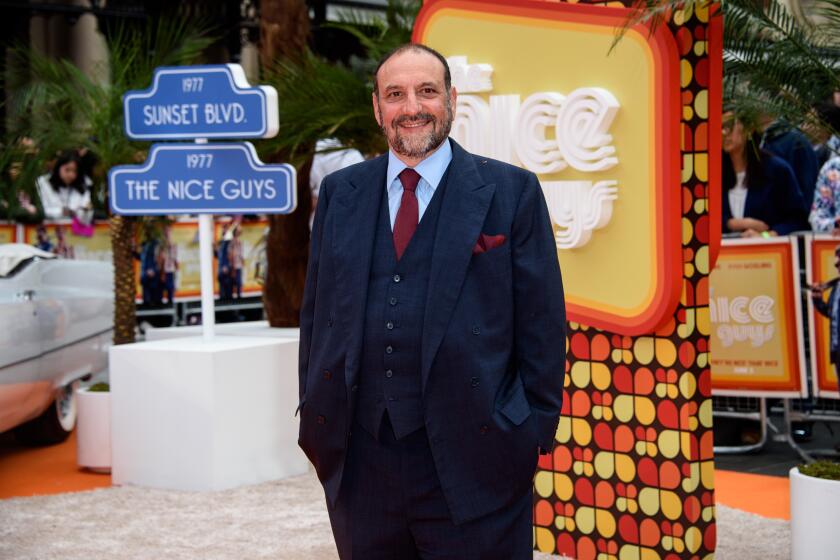‘Road House’ brawl: Amazon used AI to replicate actors’ voices during strike, lawsuit alleges
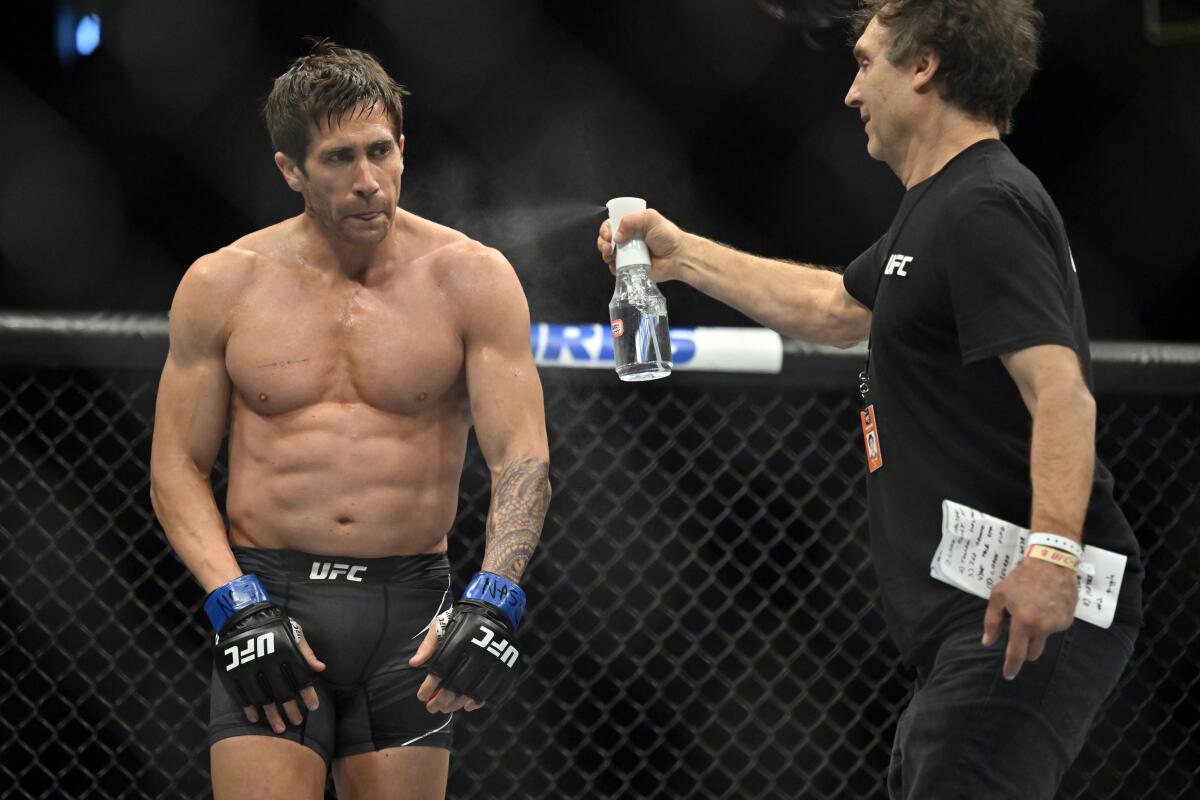
- Share via
Tensions over the upcoming “Road House” movie remake, starring Jake Gyllenhaal, are flaring again with the original film’s screenwriter taking a legal swing at Amazon Studios.
On Tuesday, R. Lance Hill, who wrote the screenplay for the 1989 cult movie, sued Metro-Goldwyn-Mayer Studios and its parent, Amazon Studios, claiming copyright infringement and seeking declaratory relief.
Hill, who goes by the pen name David Lee Henry, alleges the Seattle e-commerce giant ignored his ability, under the U.S. Copyright Act, to reclaim the rights for his 1986 screenplay, “Roadhouse,” which spawned the original movie and this year’s reboot, in which Gyllenhaal portrays an ex-UFC fighter who struggles to leave his brawling days behind.
In the lawsuit filed in the U.S. Central District Court in Los Angeles, Hill alleges that he filed the necessary petition with the U.S. Copyright Office in late 2021, requesting that the copyright revert back to him when United Artists’ claim was due to expire in November 2023. United Artists released the original movie, which featured Patrick Swayze.
But Amazon, which owns the “Road House” rights through its acquisition of MGM’s film library, allegedly ignored his copyright claims and plowed ahead — even taking steps to work around the SAG-AFTRA strike — to attempt to finish the movie before the copyright expired, according to the suit.
Amazon “went so far as to take extreme measures to try to meet this November 10, 2023 deadline, at considerable additional cost, including by resorting to the use of AI (artificial intelligence)” during last year’s SAG-AFTRA strike, Hill’s lawsuit claims. He alleges Amazon used AI to “replicate the voices” of the actors in the 2024 remake.
The movie was completed in January — about two months after the copyright deadline, the suit claims.
The lawsuit also alleged that the use of AI to simulate actors’ voices violated provisions in collective bargaining agreements between the major studios, including Amazon, and the Screen Actors Guild-American Federation of Television and Radio Artists, as well as the studio alliance contract with the Directors Guild of America.
However, a person close to the studio, who was not authorized to speak publicly, suggested that, if AI was used during production, it was only during early cuts of the film. Studio executives instructed the filmmakers to remove any AI or nonunion performers from the final cut, this person said.
“The lawsuit filed by R. Lance Hill regarding ‘Road House’ today is completely without merit and numerous allegations are categorically false,” an Amazon MGM Studios spokesperson said in a statement. “The film does not use any AI in place of actors’ voices. We look forward to defending ourselves against these claims.”
The suit seeks to block distribution of the film, which is scheduled to become available March 21 on Amazon Prime Video.
Yes, that was really Jake Gyllenhaal pretending to fight Jay Hieron at Saturday’s UFC 285, which doubled as a movie set for the actor’s next project.
The reboot had already stirred controversy. Director Doug Liman has said he’ll boycott the film’s premiere, which is slated to open next month’s South by Southwest Film & TV Festival in Austin, Texas. In an essay published last month by industry site Deadline, Liman expressed dismay that Amazon was sending the movie to its Prime Video streaming platform rather than releasing it widely in theaters.
When Amazon Studios announced the movie in mid-2022, it said the film was greenlighted as a streaming title.
In the remake, Gyllenhaal’s character, named Dalton, meets a roadhouse bar owner, played by Jessica Williams (“The Daily Show” and “Shrinking”), who needs a bouncer to protect her Florida Keys haunt from thugs who bring in a character played by real-life mixed martial arts fighter Conor McGregor.
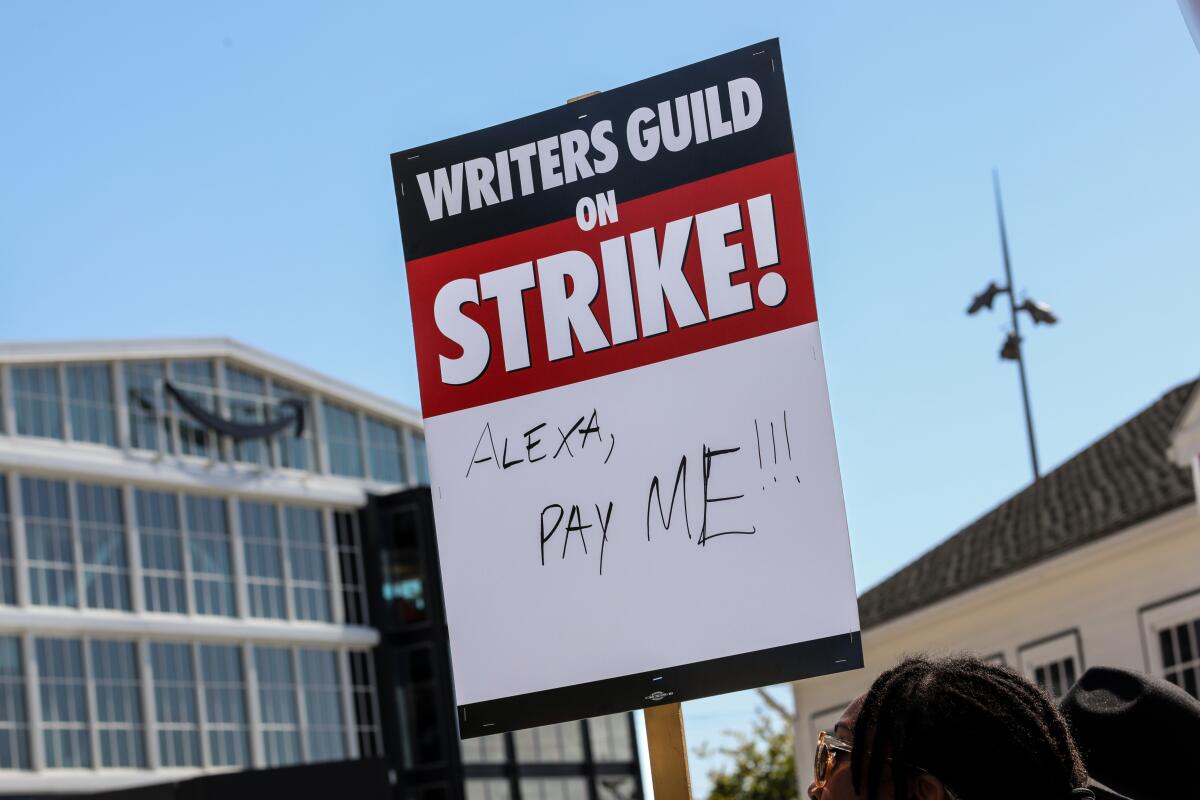
In the original, Swayze played the muscle-ripped bouncer, also named Dalton, who (mostly) kept order at Double Deuce bar in Missouri.
The behind-the-scenes struggles over “Road House” provide a clear view of the consolidation of Hollywood — and its ramifications. United Artists was formed more than a century ago by a cadre of film luminaries, including Charlie Chaplin and Mary Pickford. MGM bought the storied label in 1981.
In 2006, MGM brought in Tom Cruise and producing partner Paula Wagner in a joint venture to reinvigorate the film label. But the rebooted UA released just two movies, “Lions for Lambs” and “Valkyrie,” before Wagner departed as chief executive. MGM bought back full control of the historic label in 2012 and the assets were included as part of Amazon’s $8.5-billion purchase of MGM — a deal that was completed two years ago following a long regulatory review.
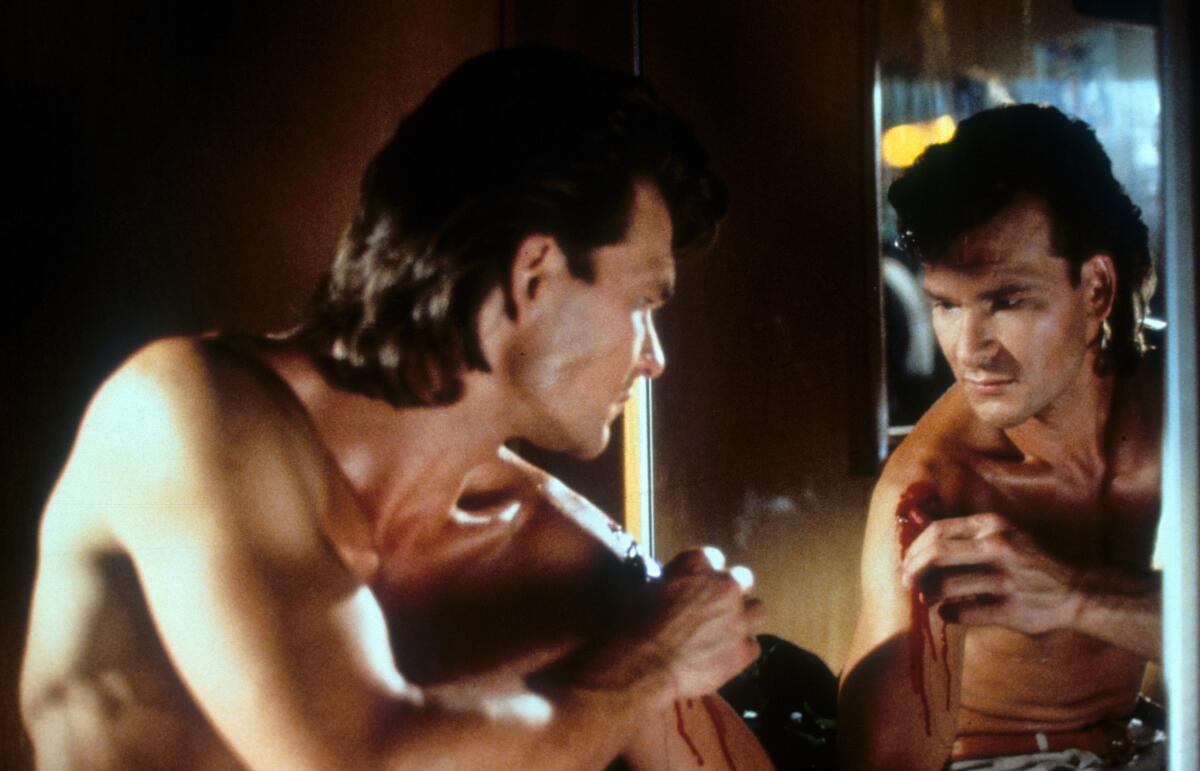
Hill’s suit said that on Nov. 10, 2021, he notified United Artists and its successor companies, alerting them to his plans to recover the copyright to the screenplay — providing the so-called “statutory notice of termination,” per the Copyright Act.
But, the suit said, Amazon would not recognize that Hill had terminated the studio’s ability to exploit the source material.
“Instead, defendants steamrolled ahead with the production of a remake of the 1989 film ... derived from Hill’s screenplay,” the suit said. “Despite the 2024 Remake’s obvious exploitation of the screenplay, defendants did not bother to even try to secure a new license of film and ancillary rights.”
The dispute between Hill and Amazon centers, in large part, on whether Hill wrote the original screenplay “on spec,” with plans to pitch it to movie studios once he finished the script, or if he was under contract to United Artists at the time.
UA entered into a “literary purchase agreement” with Hill doing business as Lady Amos Literary Works Ltd., his personal company. The copyright assignment for all rights to the screenplay was struck with Lady Amos and Hill, the lawsuit said.
“Hill had neither an employment nor a contractual relationship with United Artists when he wrote the screenplay,” the lawsuit said. “Rather, United Artists attained the 1986 grant from Hill well after the screenplay had been completed.”
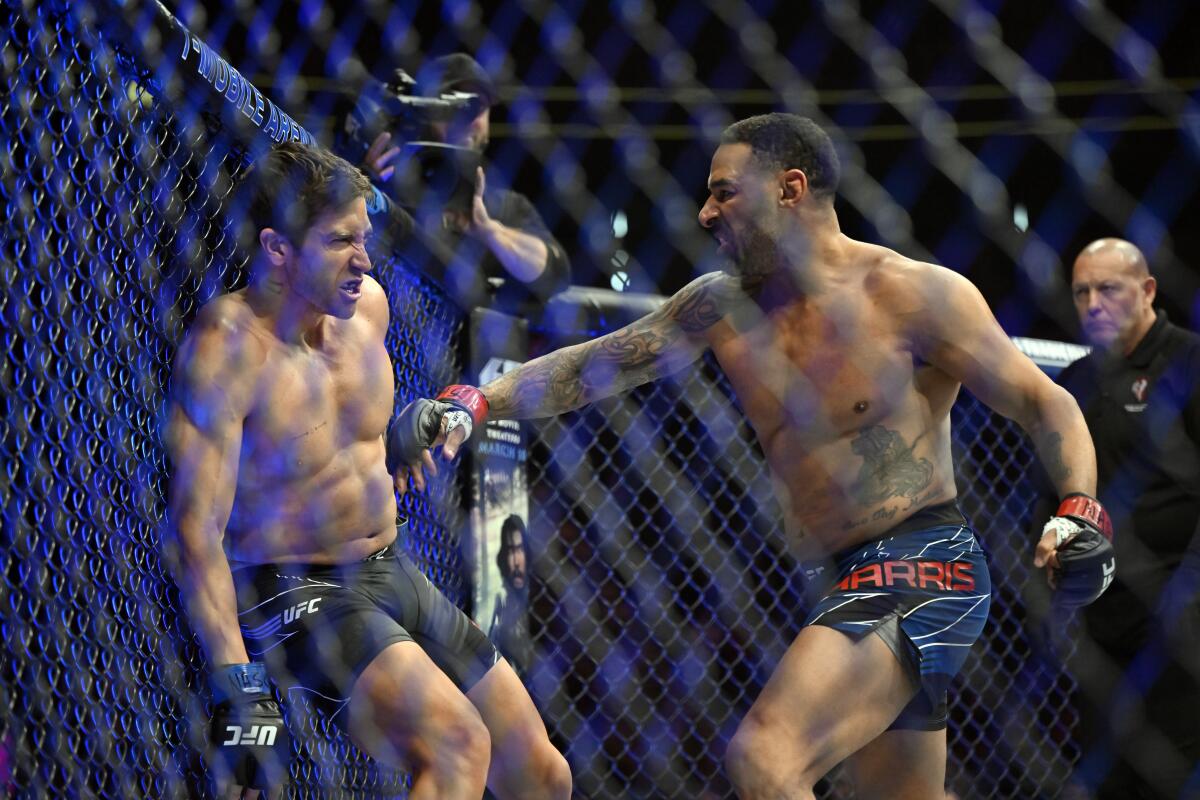
The original movie was directed by Rowdy Herrington and produced by Joel Silver, who has a producer credit on the 2024 remake.
Variety reported that Silver was sidelined last fall amid tensions with the studio.
Malibu attorney Marc Toberoff, who is handling Hill’s case, specializes in intellectual property law.
He has a long track record, including winning a summary judgment in similar Copyright Act cases on behalf of “Friday the 13th” creator Victor Miller and the children of music legend Ray Charles. He represented the family of “Superman” co-creator Jerry Siegel, helping the family recapture a half-interest in the copyright for the iconic hero.
Toberoff has handled high-profile cases against Marvel Studios and later, Walt Disney Co., on behalf of the heirs of creators of Marvel characters, including the family of Jack Kirby (“Thor,” “X-Men” and “Black Panther”). That case was settled before the U.S. Supreme Court took it up. The attorney also represented Steve Ditko (“Spider-Man”), Larry Lieber (“Thor,” “Iron Man”), Don Rico (“Black Widow”), Gene Colan (“Guardians of the Galaxy”) and Don Heck (“Iron Man” and “Black Widow”).
Hollywood producer Joel Silver is no longer attached to the Amazon film ‘Play Dirty,’ The Times has confirmed. Variety reported earlier that he had been accused of verbal abuse.
U.S. copyright law allows for authors to recapture the rights to their material that was transferred after 1977.
In such instances, the author has “a five year period commencing 35 years after the date the rights were transferred” to terminate the copyright held by the studio, Hill’s suit said.
“Notice of termination may be served by the author at any time between 10 and two years before the effective termination date,” according to the law.
More to Read
Inside the business of entertainment
The Wide Shot brings you news, analysis and insights on everything from streaming wars to production — and what it all means for the future.
You may occasionally receive promotional content from the Los Angeles Times.

